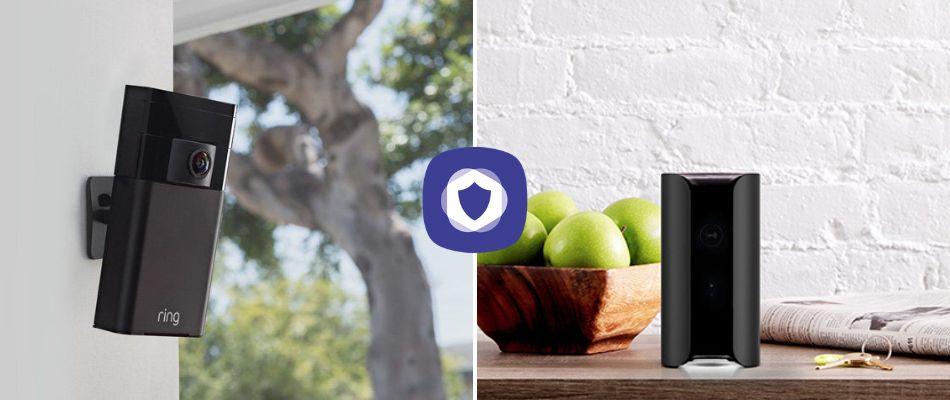If you’re looking to up your home security game, video cameras are an excellent addition, but choosing the best home security cameras can be tricky. There are plenty of providers to choose from, including Ring and Canary.
Canary is an international security provider with customers in Europe and the USA; it was launched recently with the support of a Kickstarter campaign. Ring is an Amazon-owned security company that shot to fame in 2013 for its revolutionary video doorbell. There are many similarities, along with key differences. Let’s break it down to see what each service offers you.
Ring vs Canary: What do they have in common?
- HD camera quality: Regardless of your chosen provider, you’ll have access to cameras with some of the best specs.
- Smart home integration: Ring and Canary are both compatible with some Z-wave products, including Amazon’s Alexa and Google Home.
- Person detection: Both camera systems have high-quality motion sensors allowing for person detection.
- Flexibility: Flexibility is one of the core offerings of both brands.
- DIY installation: You’ll need to be comfortable installing your cameras.
- Mobile app: Via your mobile app, available on Android and iOS, you can monitor your security cameras and receive push notifications.
- Night vision: Several security cameras that these providers offer have night vision capabilities.
- Motion detection: You can purchase motion-activated cameras with customizable motion zones.
Ring vs Canary: What are the differences?
- Professional monitoring: Canary doesn’t offer to monitor, but Ring offers monitoring for $10 per month.
- Frame rate: For some of Ring’s cameras, the frame rate is lower than Canary’s.
- Local storage: Canary keeps 30-days of video history, but Ring can keep up to 60 days of footage.
- Two-way talk: While both providers offer two-way talk, Canary keeps this behind a paywall.
- Discounts: You can get a better deal on your Canary system by signing up for a one-year or two-year contract.
- Environmental sensors: Ring offers compatibility with environmental sensors such as smoke alarms, carbon monoxide sensors, etc. Canary is more of a one-trick pony.
Canary Security: What you need to know
Canary is a home security company that started with a successful Kickstarter campaign in 2013; it’s known for its line of impressive home security cameras with multiple useful features.
Installation
Installation is wireless and straightforward; you won’t need to drill holes or rely on ethernet cables. If you have problems, you can troubleshoot with multiple online options, including a live chat.
Equipment
Currently, Canary centrally offers cameras and mounts only. The Canary Pro has great built-in extras, such as a built-in climate monitor, though some companies provide this sold separately.
Core system:
- Canary Pro
- Canary View
- Canary Flex
Mounts
You’ll need to select a mount to install your system; available mounts include:
- Secure mount
- Twist mount
- Stake mount
Home automation
The smart home integrations offered are sparse; no smart lock/light integration is available. But it is Z-wave compatible. Z-wave products include:
- Amazon Alexa
- Google Assistant
- Wink
- Apple TV
Costs
There are several costs to consider when you purchase a new Canary system, including:
- Equipment: You’ll buy your equipment upfront, but you can save money by subscribing.
- Monthly costs: If you only want basic service, there are no monthly costs. But many features are behind a paywall, so you may choose to subscribe at $9.99 monthly.
Nerd Pros
- Money-back guarantee: Canary has a generous warranty and moneyback guarantee; you’ll be eligible for a full refund for 60-days.
- Price: The priciest Canary camera, the Canary Flex model, is $129. This is a bargain considering it’s weatherproof and suitable for outdoor and indoor use. It’s affordable to unlock high-tier features, too.
- Unique features: Canary offers unique features such as AI technology that automatically disarms/arms your system based on who’s seen arriving or leaving. Some camera models have a siren, climate control, and AI technology.
Nerd Cons
- No door or window sensors: The lack of door/window sensors is a downside. You’re vulnerable unless you purchase a camera for every entry point.
- No monitoring services: Canary only has a panic button; there’s no professional monitoring.
Ring: What you need to know
Like Canary, Ring was launched in 2013 with its video doorbell. Ring now offers more, from traditional security cameras to smart lighting. Let’s take a look at what they have to provide you with.
Installation
The wired systems can be quite complex to install; if you’re looking for an easy install, you should stick with the battery-powered wire-free cameras, or you can hire a tradesperson to assist with your installation. Depending on where you live, you could get an estimate from Amazon.com for this.
Equipment
Ring offers a large array of equipment or compatibility with it. Equipment available from Ring includes:
- Keyless door locks
- Smoke and carbon monoxide detectors
- Smart video doorbells
- Outdoor cameras
- Indoor cameras
- Flood and freeze sensors
- Carbon monoxide and smoke detectors
- Panic buttons
- Open window magnets
- Solar security signs
- Window security stickers
- Smart outdoor lighting
- Mailbox security
- Garage door tilt sensors
- Deadbolts
- Outlets
- Lighting.
The base package includes:
- Base station
- Keypad
- 5 contact sensors
- 2 motion detectors
- Range extender
Home automation
It’s not difficult to incorporate Ring into a smart home system, including carbon monoxide sensors, smoke detectors, video doorbells, smart lighting, and window sensors. There isn’t much third-party automation, though.
Pricing
- Equipment costs: Ring’s alarm packages start at $199 to $589 for a sizeable 20-piece system. You can buy items individually.
- Monthly costs: Monitoring is optional, but if you decide to have a professionally monitored system, you’ll pay $10 monthly. You can get a discount by paying yearly.
Nerd Pros
- Indoor and outdoor cameras: Ring offers a vast selection of cameras designed for indoor and outdoor use, with built-in motion sensors.
- Affordability: For $199, you’ll receive a 5-piece set from Ring; you can also add on professional monitoring and additional paid storage.
- Professional monitoring option: If you don’t want the responsibility of monitoring your own security system, Ring can take care of it for just $10 a month.
Nerd Cons
- Limited package options: Ring doesn’t offer customizable packages.
- Video storage fees: If you’re looking to save your video footage, you’ll need to sign up for one of Ring’s cloud storage plans.
- Upfront payment: While it may be great to avoid a long-term contract, this does mean you can’t spread the cost out long term. It may be more costly to buy everything upfront without a discount.
Ring or Canary?
If you’re looking for smart security cameras to be part of a more comprehensive security system, you should consider Ring. Ring and Canary have many similarities, including video quality with 1080p HD video and similar functionalities. But there are some differences, with Ring providing more outdoor security cameras and two-way audio functions to all customers. If you’re looking for a discount for signing up for a long-term contract, and are happy to pay a little extra for features such as two-way talk, then Canary is a worthy choice.
Get Ring Cameras Get Canary CamerasThis article has been reviewed and approved by Officer Banta.

Officer Banta is the official SecurityNerd home security and safety expert. A member of the Biloxi Police Department for over 24 years, Officer Banta reviews all articles before lending his stamp of approval. Click here for more information on Officer Banta and the rest of our team.

